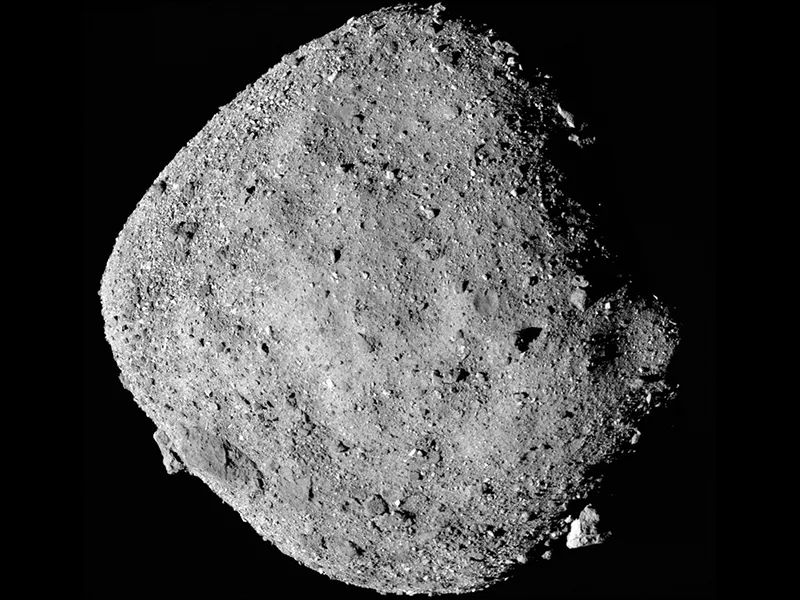Asteroid 2008 OS7: A space rock the size of a football stadium will approach Earth on Friday, and because of its size and proximity, NASA scientists will be attentively monitoring it for any possible risks.
Table of Contents
A cosmic body with a diameter of 890 feet will approach Earth closely on Friday, traveling just 1.7 million miles across the planet. This distance is comparable to the separation between Earth and the Moon by about seven times. About eleven miles per second is the estimated velocity of the asteroid, according to NASA’s Jet Propulsion Laboratory.
Asteroid 2008 OS7
Every 962 days, a space object by the name of Asteroid 2008 OS7 completes a full rotation around the Sun. It is therefore anticipated that 2026 will mark its next appearance. But it won’t get this close to Earth until 2037, when it will be only ten million miles away.
NASA classifies objects greater than 150 meters that are within 4.6 million miles of Earth as “potentially hazardous objects,” meaning that NASA is closely monitoring any potential threat posed by these objects.
About 9:41 a.m. EST on Friday is when it is expected to pass Earth. Even though it might not be seen with the unaided eye, NASA offers a digital tool that allows users to track asteroids in real time around the solar system. In addition, the event will be streamed live by the Virtual Telescope Project.
NASA estimates that there are about 1.3 million asteroids in our solar system.
Asteroid 2008 OS7 Information In Table Format
| Aspect | Details |
| Object Name | Asteroid 2008 OS7 |
| Size | 890 feet in diameter |
| Close Approach | 1.7 million miles from the Earth |
| Relative Distance | Seven times the distance between Moon & Earth |
| Speed | 11 miles per second |
| Orbital Revolution | One revolution around Sun in 962 days |
| Category | Potentially Hazardous Asteroid |
| Next Appearance | Expected in 2026 |
| Origin | Remnants from the solar system formation |
| Next Asteroid Approaching | Asteroid 2024 BJ3, Asteroid 2024 BP1 |
According to NASA, asteroids are comparatively small solid celestial bodies that orbit the Sun, much like planets. The materials left over from the solar system’s formation some 4.6 billion years ago make up these celestial bodies. As one of the 18,232 asteroids in the Apollo-class, asteroid 2008 OS7 is known to be capable of intersecting the orbit of Earth.

NASA is now more concerned than ever about the possibility of an asteroid hitting Earth in the near future. The Double Asteroid Deflection Test was the organization’s first test, and it successfully changed an asteroid’s course in 2022.
NASA launched a spacecraft into orbit with success, crashing into the asteroid to shorten its orbit by 32 minutes. Apart from that, NASA launched a different mission using the OSIRIS-REx spacecraft to study an asteroid called Bennu that is near Earth.
The spacecraft brought samples back to Earth in September 2023 samples extracted from the asteroid. Till now, the public has not been informed of the mission’s result. There is a strong belief among experts that Bennu may potentially hit with Earth in 2182, which is why further research is being undertaken on this asteroid.
The specialists working on the OSIRIS-REx project believe that by 2182, there is a 1 in 2,700 chance that Bennu would collide with an area of Earth the size of Texas, according to an article published in the scientific journal Icarus in 2023.
Not only will asteroid 2008 OS7 pass Earth tomorrow, but two other asteroids will also approach quite closely. Among them is the recently found space rock known as Asteroid 2024 BJ3, which is about the size of an airliner at 70 feet in length.
The size of an airliner, asteroid 2024 BP1, will approach Earth closely, passing within 533,000 miles of our globe. Even while this is a considerable distance, it should be remembered that it is still significantly closer than 2008 OS7, another asteroid that passed near Earth. In 2024, BP1 will be approximately 2.1 million miles from Earth at its closest point, a significant distance from its closest approach.